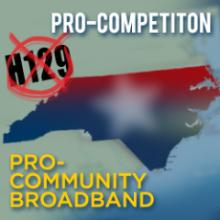Rockingham County has joined Raleigh in officially passing a resolution against legislation to cripple community networks in the state.
RESOLUTION
BY THE ROCKINGHAM COUNTY BOARD OF COMMISSIONERS
AGAINST SENATE BILL 87 and HOUSE BILL 129
WHEREAS, Senate Bill 87 and House Bill 129 have been introduced in the 2011-2012 Session of the General Assembly of North Carolina; and
WHEREAS, these bills do not provide a level playing field to cities, towns and counties, but greatly hinder local governments from providing needed communications services, especially advanced high-speed broadband services, in unserved and underserved areas; andWHEREAS, these bills impose numerous obligations on cities and towns that private broadband companies do not have to meet; and
WHEREAS, private companies, despite having received favorable regulatory and tax treatment to enable broadband investment, have chosen to avoid the financial commitment necessary to provide top quality services to all residents and businesses; and
WHEREAS, while private companies declare top quality service is cost-prohibitive in our country, the United States continues to lose ground to other nations in broadband access, user cost and growth in number of users, falling behind the United Kingdom, Korea, France, Japan and Canada to name a few, and Japan has Internet access that is at least 500 times faster than what is considered high-speed in the United States and at less cost; and
WHEREAS, the bills would prohibit North Carolina cities and towns from using federal grant funds to deploy or operate locally-owned or operated broadband systems, thereby denying N.C. residents access to federal assistance available to the rest of the country and hindering employment opportunities; and


